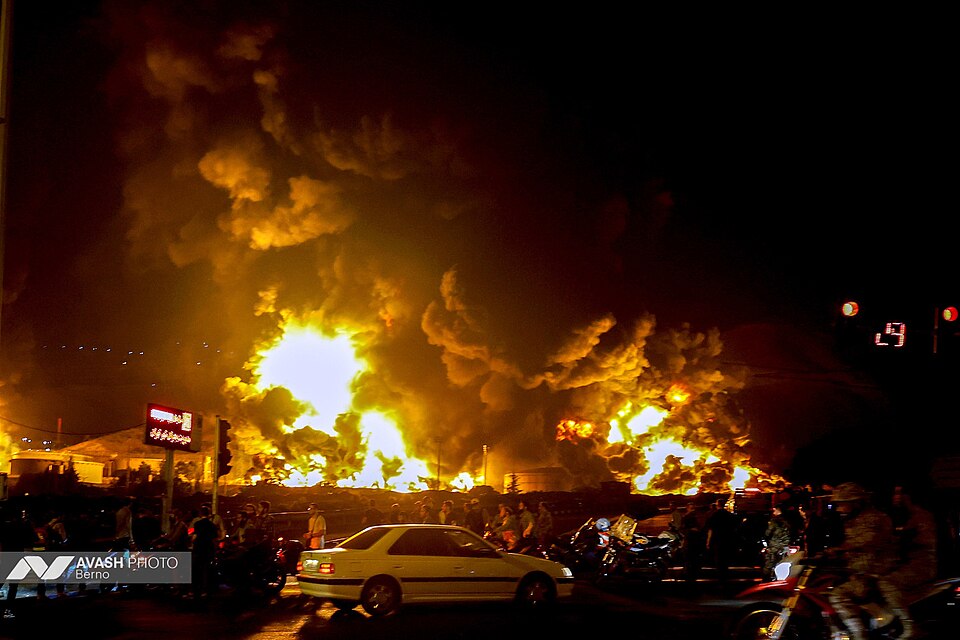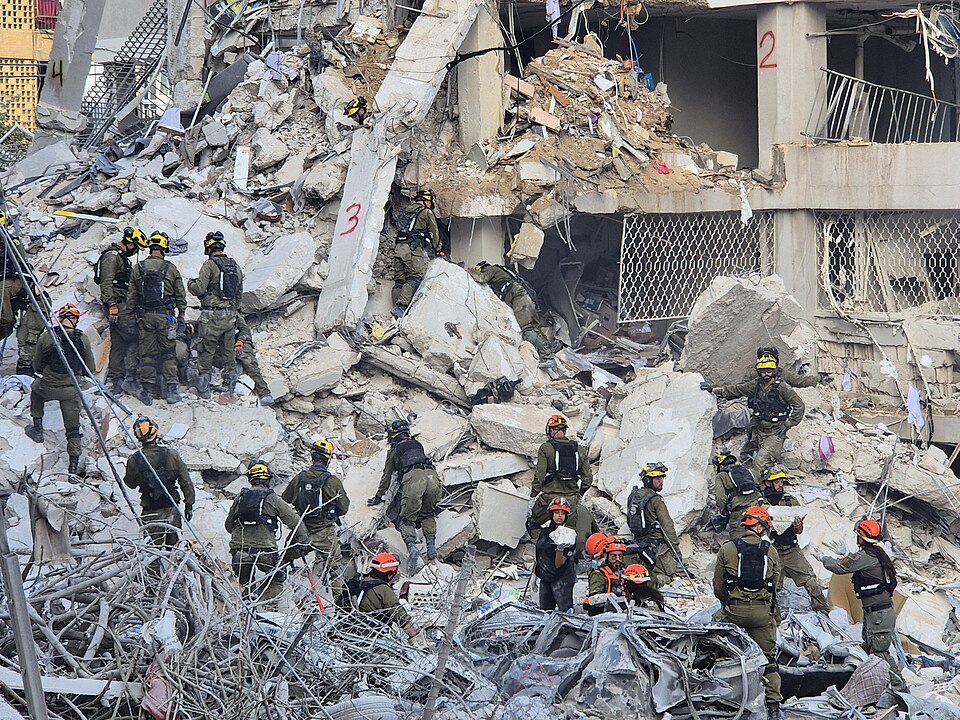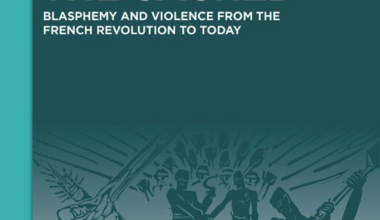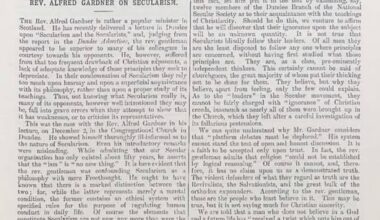

The war that began nearly two weeks ago—with Israel launching a series of bombardments on Iranian military installations and killing several high-ranking commanders of the Islamic Republic’s armed forces—marks an escalation in a decades-long war between the two regimes. This latest round of violence is not a sudden rupture, but the culmination of years of covert operations, proxy confrontations, cyber warfare, and ideological posturing. What we are now witnessing is the long-anticipated transition from indirect hostilities to an open, direct military conflict between Iran and Israel and the United States.
For more than forty years, the Middle East and North Africa have served as the primary battleground for the geopolitical rivalry between the Islamic regime in Iran, the United States, and the Israeli state. The Islamic regime of Iran and the Israeli state, dominated by the right-wing Benjamin Netanyahu, have vied for regional dominance—one under the banner of anti-Zionist ‘resistance’, the other under the guise of self-defence and national security. Each has sought to expand its sphere of influence through strategic alliances, military interventions, and support for proxy forces, often at the expense of the rights and lives of the people of the region.
It is essential to recognise that on both sides of this war stand governments with extensive histories of human rights abuses, state terrorism, and the most brutal denials of people’s sovereignty. This war is not a war of liberation or a pursuit of justice. It is a conflict between two oppressive regimes—each invoking the language of victimhood and defence while perpetrating violence at home and abroad. And, as always, it is the people of the region—not the generals or politicians—who will bear the greatest fallout of this war.
The Islamic regime has no legitimacy
The Islamic Republic of Iran, since its inception in 1979, has amassed a grim legacy of bloodshed, repression, and authoritarian control. In the immediate aftermath of the revolution, the regime turned against the people of Iran, crushing political dissent and executing thousands of socialists, dissidents, freethinkers, and opposition groups throughout the 1980s. The infamous 1988 mass executions of political prisoners, carried out in secret and without due process, remain a defining stain on its history. In the decades since, the cycle of state violence has continued unabated—from the brutal crackdown on the protests in 2009, to the massacre of protesters in November 2019, to the repression of the 2022 uprising in the name of ‘Woman, Life, Freedom’.
The Islamic Republic of Iran, with its brutal theocratic rule, has for decades suppressed dissent, persecuted minorities, and executed political opponents, denied women’s rights, funded Islamist groups, and abused and actively undermined the Palestinian desire for liberation.
Under the Islamic Republic, systemic poverty and inequality have deepened, as economic resources are funnelled into military ventures and ideologically-rooted expansionism. Women have been denied fundamental rights and autonomy under a discriminatory legal system that treats them as second-class citizens. Workers, teachers, students, and other segments of the labour force are routinely harassed, jailed, or silenced when they demand dignity, fair wages, or basic democratic freedoms. For Iran’s working class, the cost of the regime’s regional ambitions—in Syria, Lebanon, Iraq, Yemen, and, I must add, Palestine—has been paid for in chronic inflation, crumbling infrastructure, and generational despair.
The Islamic regime, facing staunch opposition from the Iranian people and with its back to the wall, clearly welcomes this new conflict as a means to externalise its troubles and brutally suppress any opposition under the new wartime situation. As soon as the war started, the regime intensified its control and grip, and now threatens executions of political prisoners or summary executions of anyone who opposes its war mission.
For the genocidal Israeli government, a heavenly gift
On the other side of this escalating conflict stands Israel, whose statehood project has been marked by its own long and violent record. Since 1948, Israel has engaged in the ongoing dispossession and ethnic cleansing of Palestinians, from the Nakba to present-day apartheid policies across the occupied territories.
For nearly eight decades, it has enforced a regime of occupation, surveillance, and structural violence that has dehumanised millions of Palestinians and denied them the most basic human rights. The recent assault on Gaza—characterised by indiscriminate bombing, mass displacement, and the systematic targeting of civilian infrastructure—has reached the threshold of what even the most conservative international observers and legal experts now identify as genocide. It is one of the most brutal mass killings in modern history, unfolding in real-time before a watching world.
In addition, Israel has long operated as the West’s military outpost in the region—a garrison state bolstered by billions in aid and unconditional political support from the US and European powers. Far from promoting stability, Israel’s actions have contributed to the collapse of civil societies in the Middle East and North Africa and taken on the ‘dirty work’ of Western governments, as confessed by the newly appointed German Chancellor.
The role that the Israeli government, which is dominated by ultra-right-wing messianic religious sects, plays in exacerbating sectarian tensions, fuelling arms races, and undermining any secular democratic movements—both in Israel and in the region—cannot be overstated. Moreover, its interventions—direct and indirect—have helped create the fertile ground for the emergence and survival of ultra-reactionary forces in Israel and beyond, including groups such as ISIS, which thrive in the vacuum left by war, occupation, and foreign intervention.
Neither the Islamic regime nor the right-wing Israeli regime represents the civilised world
In this latest confrontation between the regimes of Iran and Israel, what is presented to the world as a clash of civilisations or an act of strategic necessity is, in fact, a deadly war between two authoritarian, militarised regimes—each using the suffering of ‘their respective peoples’ to justify their grip on power. Neither side speaks for the ordinary people of the region. And once again, it is those very people—Palestinians, Iranians, Syrians, Yemenis, Lebanese, and Israelis—who will carry the heaviest burden of this war.
The rivalry between the Islamic Republic of Iran and the Israeli government is often framed in religious or ideological terms—Shia versus Jewish, Islamist versus Zionist—but these narratives mask the true nature of the conflict. In reality, their antagonism is driven not by theological disputes but by a hard-nosed struggle for regional supremacy, territorial influence, and control over political-economic levers in the Middle East and North Africa. It is a competition for power, not principle—one that long predates the current military escalations.
Both regimes have used ideological rhetoric to legitimise their ambitions: Iran claims leadership of the so-called ‘Axis of Resistance’ while Israel positions itself as the defender of Western civilisation against Islamic terrorism. But beneath these slogans lies a material battle over strategic corridors, access to natural resources, influence over proxy forces, and alignment with global powers. This rivalry has played out not only through assassinations, cyber warfare, and proxy militias, but also in economic sabotage, intelligence operations, and diplomatic campaigns to isolate or discredit the other.
Israel, European states, and NATO
Unlike the US-led invasions of and interventions in Iraq, Afghanistan, Libya, and Syria—wars openly launched under the banners of NATO, ‘regime change’, or the ‘war on terror’—Israel’s direct military strike on Iran represents a more calculated and dangerous stage-by-stage manoeuvre.
Israel’s strikes, supported by European powers including the UK and Germany, were also a gambit to create a new military reality on the ground, drawing the US in to launch its own strikes. All this to reassert Western military dominance in a region slipping out of its control, and to pull a fragmented and increasingly impotent NATO back into large-scale military interventions.
To hide and deflect from the Gaza fallout
In addition, far from being a defensive manoeuvre, Israel’s attack on Iran is a reckless and catastrophic effort to deflect from the political fallout of its crimes in Gaza. As international outrage mounts over the mass killing of civilians, the destruction of hospitals, and the deliberate starvation of an entire population, the Israeli government seeks to shift the world’s attention, to wrap itself once again in the cloak of existential threat and military necessity. By provoking a wider conflict, it hopes to reframe itself as a beleaguered actor in a regional war rather than a perpetrator of what is now widely recognised as genocide.
To destroy the Middle East and for a permanent war
This gambit, however, risks igniting a chain reaction that could plunge the entire region into chaos. With military flashpoints stretching from the Mediterranean to the Persian Gulf, any escalation between Iran and Israel threatens to draw in not only regional players but global powers already entrenched in overlapping conflicts. There are indeed factions in the West who are keen to engulf the region in a permanent war. The consequences of such a war would be catastrophic, not for the elites orchestrating it, but for the millions already living under siege, sanctions, occupations, and authoritarianism. Once again, ordinary people will be made to pay for the ambitions of regimes that claim to speak in their name but rule only through fear, violence, and division.
War and human misery
In the days following Israel’s airstrikes on multiple locations across Iran and the surprisingly effective Iranian response, the human toll has escalated rapidly: hundreds have been killed, thousands injured, and countless others displaced.
In Iran, many have been left without access to medical care, shelter, or necessities. Israel now regularly announces evacuation orders, at short notice—a brutal, inhumane policy that has been practised in Gaza to displace millions and is now also being used in Iran. The Islamic Republic’s endemic corruption, combined with its chronic mismanagement and neglect of civilian infrastructure, has left entire communities exposed and vulnerable. Instead of offering protection or relief, the state has responded with opacity, propaganda, and a familiar blend of repression and neglect. Of course, they have and continue to put resources into spying on women and persecuting unveiled women and political dissidents.
For millions of Iranians, this moment is not merely a geopolitical crisis—it is a collapse of daily life. War, as many now know from bitter experience, not only destroys buildings and borders. It destroys the ordinary rhythms of survival, interrupts access to food, water, electricity, and healthcare, and severs families from one another. It transforms survival itself into the primary and often sole concern of society, pushing all other dimensions of human life—education, creativity, dissent, community organising—into the background. The very conditions needed for social protest, for collective resistance, are eroded. Under the cover of war, governments feel emboldened to escalate their repression, silence dissent, and suspend even the pretence of accountability.
Ending this war is not only necessary to prevent further bloodshed and regional catastrophe—it is an essential demand for preserving and strengthening the anti-war movement in Israel and the ‘Woman, Life, Freedom’ movement in Iran and for allowing people to reclaim their lives and struggles from the grip of authoritarianism, poverty, and fear.
In both Iran and Palestine, in Lebanon, Syria, Yemen, Israel, and beyond, millions have struggled for justice, freedom, and dignity under unimaginable conditions. War cuts through the fragile fabric of those struggles and replaces them with the machinery of militarism, chauvinism, and despair. Anyone who thinks that this war or the victory of any side will benefit any progressive struggle is at best mistaken, at worst a hypocrite. The aftermath of the fall of Saddam Hussein, the implosion of Libya, the descent of Syria into permanent war, and the return of the Taliban to Afghanistan—all stand as grim reminders of what happens when regime change is orchestrated violence imposed from above.
Indeed, liberation cannot be outsourced to the military machines of rival dictators and states. Netanyahu’s references to ‘Woman, Life, Freedom’ and Khamanei’s crocodile tears for the plight of the people of Palestine are nothing but political deception. This war undermines and attacks both struggles. They want to bring these struggles under their control to use them against their rivals; all of this does not mean that progressive forces in Iran, Israel, and the broader region must remain silent. The capacity of the peace movement, the anti-Netanyahu coalition in Israel, the ‘Woman, Life, Freedom’ movement in Iran, and other such groups across the region must work together and forge a third way. They must speak up and be the voice that is currently desperately needed—and lacking.
Words of caution
As bombs rain down on Iran, a dangerous chorus has emerged—from far-right opposition figures to liberal and even some left-leaning parties—openly or tacitly welcoming the violence in the hope that it will weaken or bring the Islamic Republic’s collapse. Among these forces are not only neo-fascists dreaming of a post-regime power grab, but also self-described reformists and opposition parties who see the suspension of normal life and civil society as a chance to position themselves for future leadership.
Donald Trump has now jumped on the bandwagon and is advocating to ‘Make Iran Great Again’. The export of Trumpism, a mad mass hallucination compounded from a narcissistic psychopath, is of no help to Iran. Trump has no human empathy or ethical standards and relies on gullible, self-pitying people for support. This perfect mixture of the psychopathic and the psychotic, which is underpinning the rise of right-wing politics in European countries, is now engulfing the politics of the Iranian diaspora.
Much of the diaspora is coalescing around the son of the deposed shah of Iran, heir to an institution with an undemocratic history, including the use of torture, oppression, and coups to gain and maintain power. Right-wing monarchists, hand in hand with Netanyahu and organised by the Israeli embassies abroad, wave the old Iranian sword and lion flag alongside Israeli flags, and want to see the Pahlavi dynasty restored. This infantile and deceptive movement has no real base in Iran. It is manufactured in the corridors of power in Israel and by the CIA, and it is a threat to the progressive movement in Iran.
On the other hand, there are those who point to the deception, war mongering, and abuses of the Western powers to justify their support for the Islamic regime. They inadvertently project any dissent in Iran as a tool of Western imperialism and condemn it, thereby helping the regime to suppress progressive movements as the work of imperialism.
Iranian society has already endured decades of political suppression, economic devastation, and sexual violence. War compounds all these realities, pushing the most vulnerable even further to the margins. The fantasy that social progress can emerge from a war-driven collapse reveals a deep disconnect from the lived experiences of ordinary people and the hard lessons of history, from Iraq to Libya to Syria.
At this critical juncture, the responsibility of every serious social force—labour organisers, feminist and women’s liberation movements, and anti-authoritarian activists—is clear and urgent: to oppose the war unequivocally, to reject both sides of the imperial and regional militarist equation, and to stand in solidarity with the people caught in the crossfire. This means refusing the false binaries in the narratives of Israeli Western-backed militarism and the theocratic authoritarianism of the Islamic regime of Iran. Instead, the universal right of people to live, to organise autonomously, and to resist domination in all its forms—whether imposed by the Islamic Republic, the Israeli state, or any foreign power claiming moral or strategic legitimacy—must be defended.
Ending this war is not merely about halting the immediate violence and destruction; it is about safeguarding the political space and material conditions required for any meaningful struggle against injustice, patriarchy, state violence, and religious fundamentalism. War truncates the future. It buries dissent under rubble, empowers the most reactionary forces on all sides, and silences the very voices we need most—those of the workers, the women, the youth, the dissidents. A real anti-war stance must make clear that drones, missiles, or capitalists cloaked as clerics cannot deliver liberation. Only through the self-organisation of the oppressed can liberation be achieved.
Or, in short: let there be Woman, Life, Freedom!
Related reading
The ‘Women’s Revolution’: from two activists in Iran, by Rastine Mortad and Sadaf Sepiddasht
The Silent Revolution Against Religious Oppression in Iran, by Siavash Shahabi
The Racism of Anti-Racists: Bourdieu, Said, and Inverted Orientalism, by Siavash Shahabi
No Hijab Day, 1 February: Confronting Misogyny, by Maryam Namazie
Image of the week: celebrating the death of Ebrahim Raisi, the Butcher of Tehran, by Daniel James Sharp
Iran and the UN’s betrayal of human rights, by Khadija Khan
Rap versus theocracy: Toomaj Salehi and the fight for a free Iran, by Noel Yaxley
Verses of Life: A Review of ‘Woman Life Freedom: Poems for the Iranian Revolution’, edited by Bänoo Zan and Cy Strom, by Daniel James Sharp
A Small Light: Acts of Resistance in Afghanistan, by Zwan Mahmod
Feminism and religion are incompatible, by Maryam Namazie
The Taliban’s unceasing war on Afghan women, by Khadija Khan
Secularism is a feminist issue, by Megan Manson
An Islamic (mis)education about Israel, by Hina Husain
Is the Israel-Palestine conflict fundamentally a nationalist, not a religious, war? by Ralph Leonard
Young, radical and morally confused, by Gerfried Ambrosch
Israel in Gaza: Humanity’s Canary in a Coal Mine? by Brian Victoria
US Election 2024: Yet Another Farcical and Costly Contest, by Zwan Mahmod
Israel’s war on Gaza is a war on the Palestinian people, by Zwan Mahmod
US Election 2024: On ‘Lesser Evilism’, by Ralph Leonard
Confronting identity politics, a breeding ground for division and dehumanisation, by Maryam Namazie
‘F*** it, think freely!’ Interview with Brian Cox, by Daniel James Sharp
Britain’s liberal imam: Interview with Taj Hargey, by Emma Park






Your email address will not be published. Comments are subject to our Community Guidelines. Required fields are marked *
Donate